Memoir of John Shakespear Bartley, 1916-1919 - Part 17
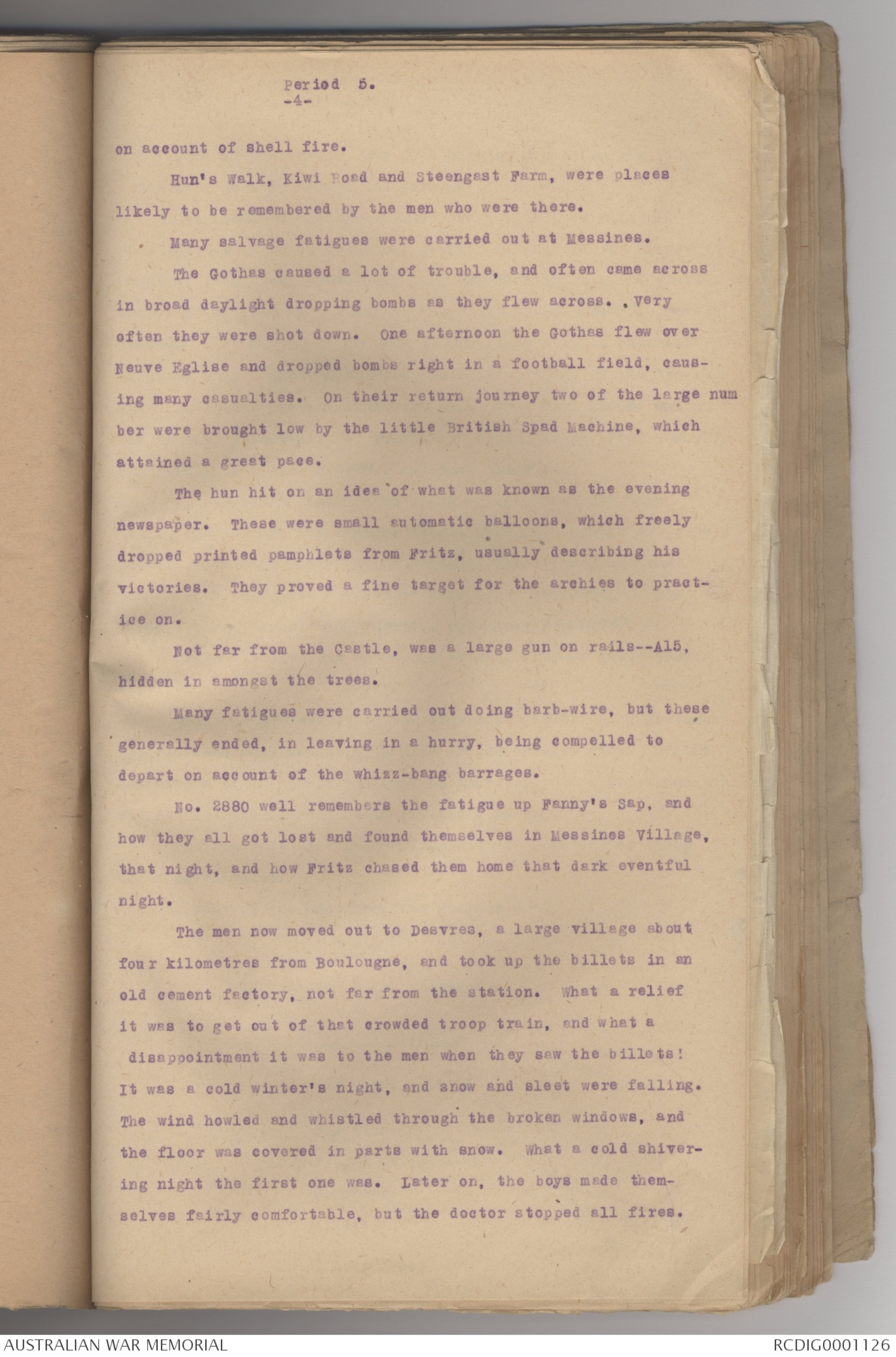
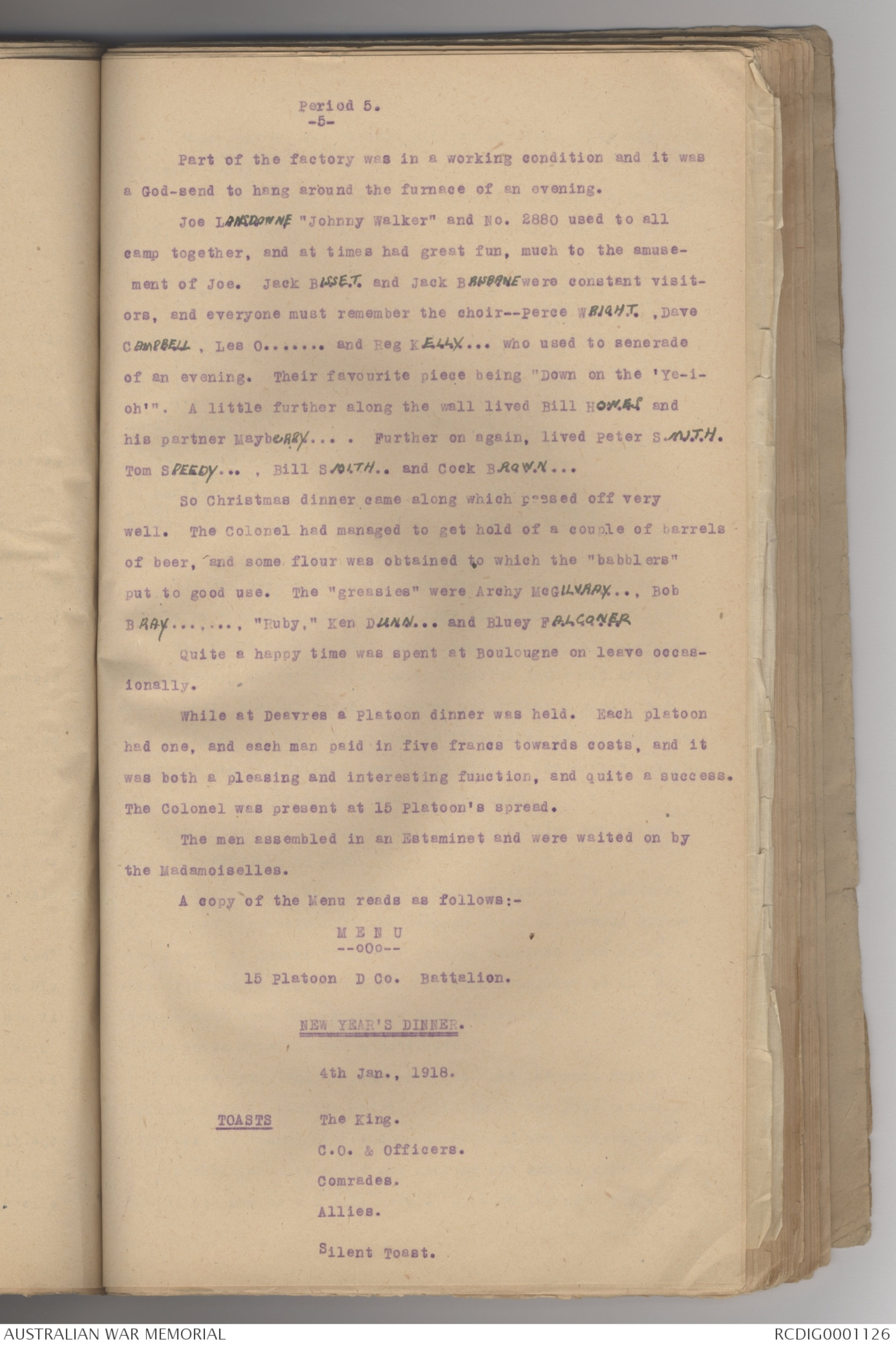
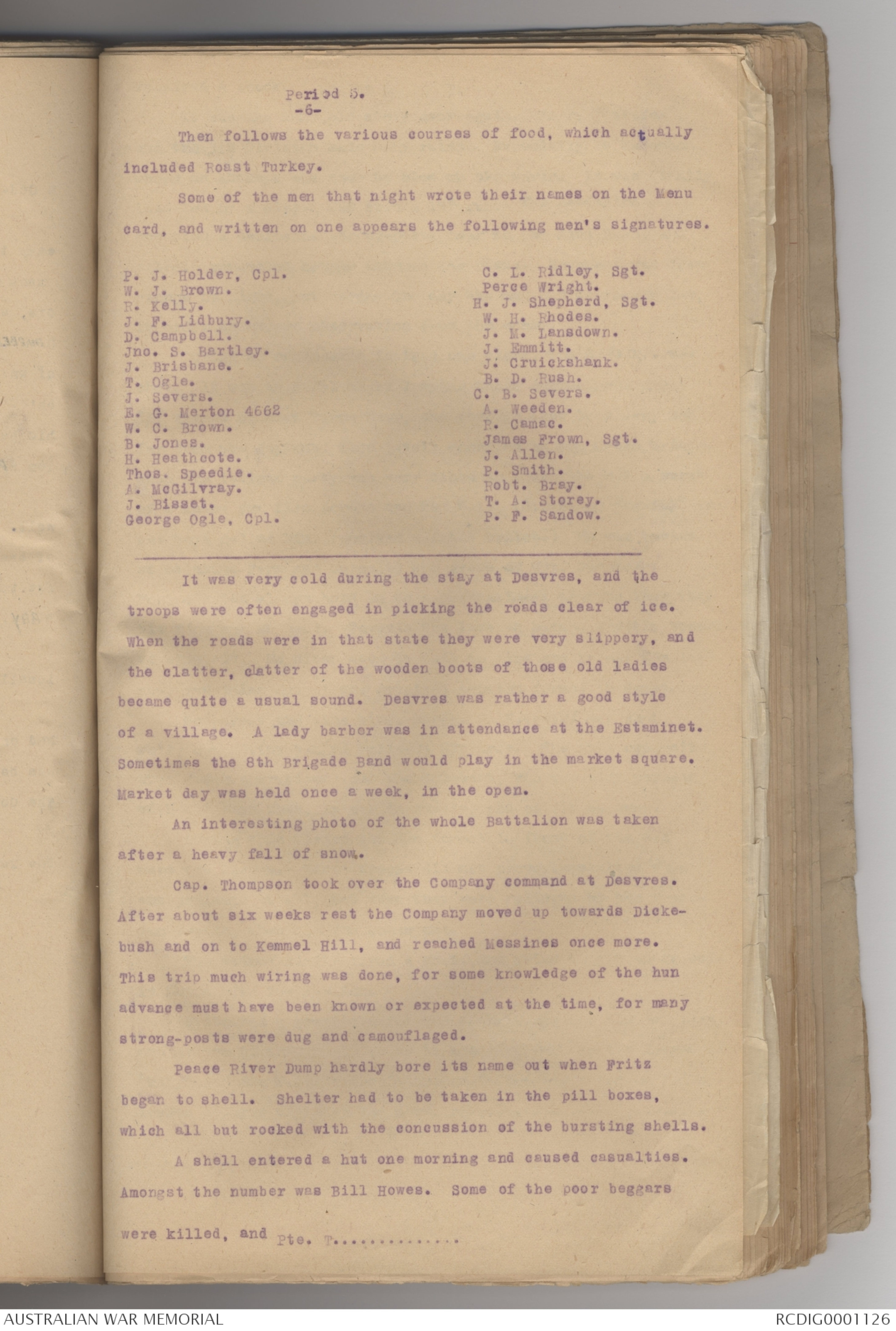
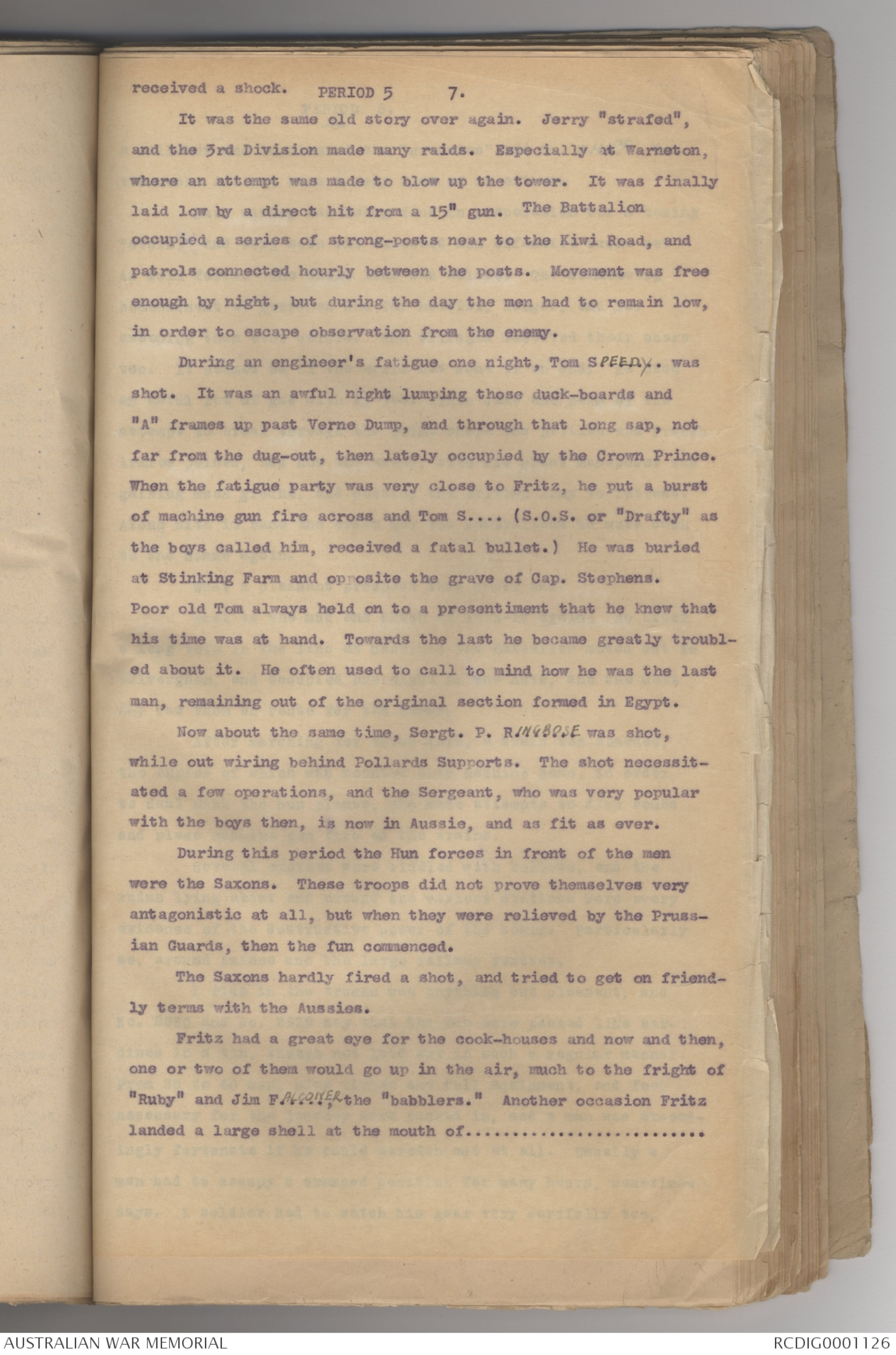
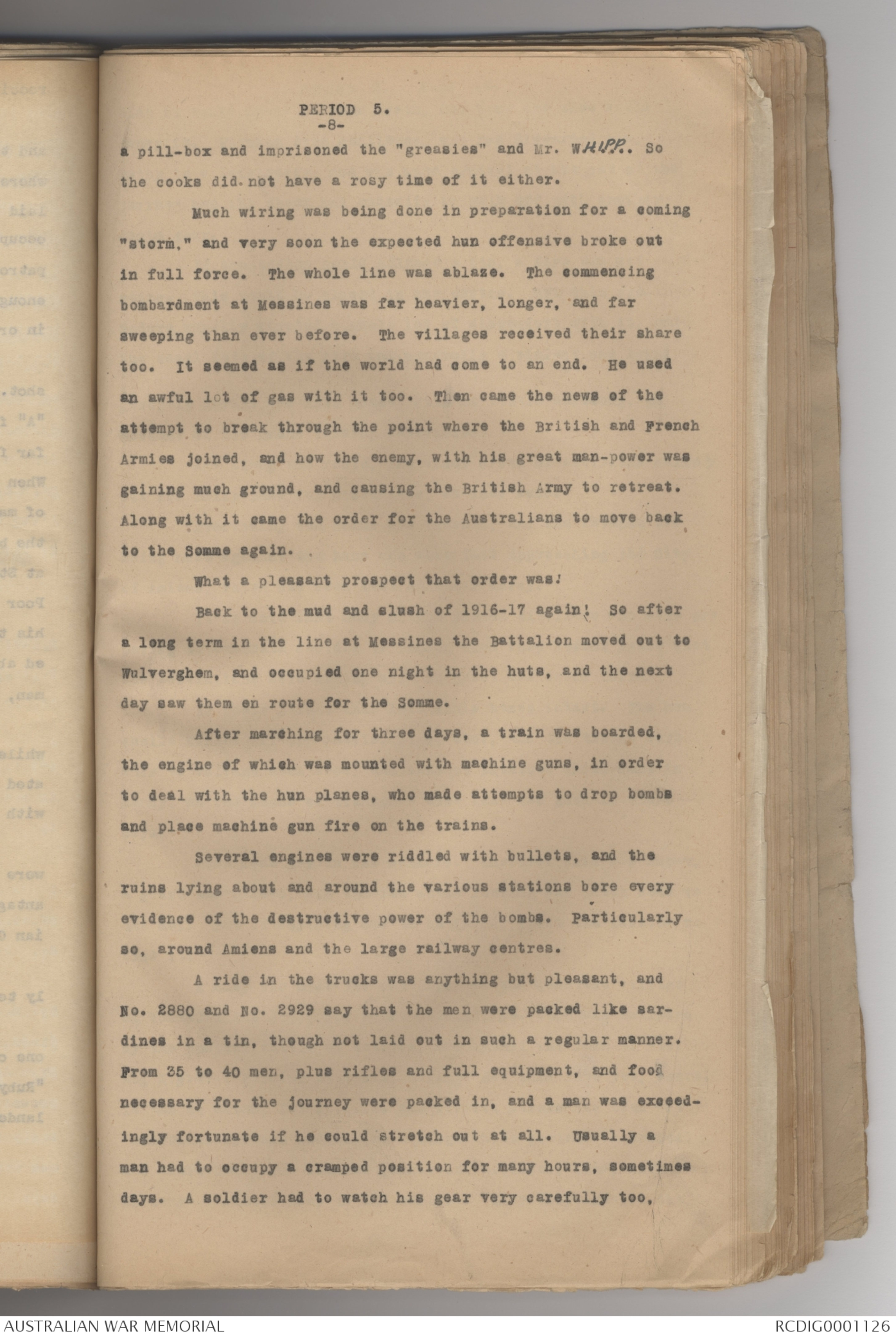
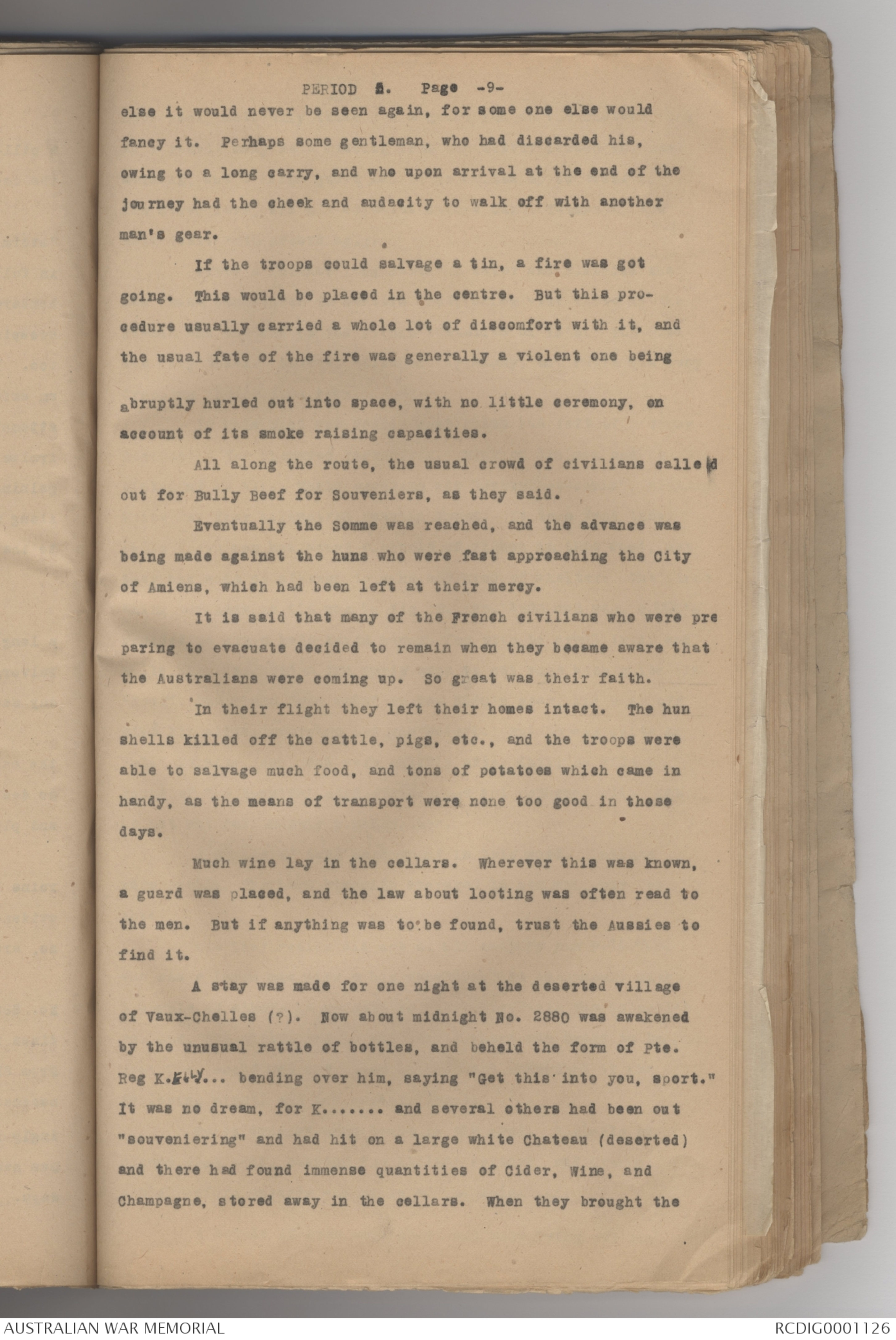
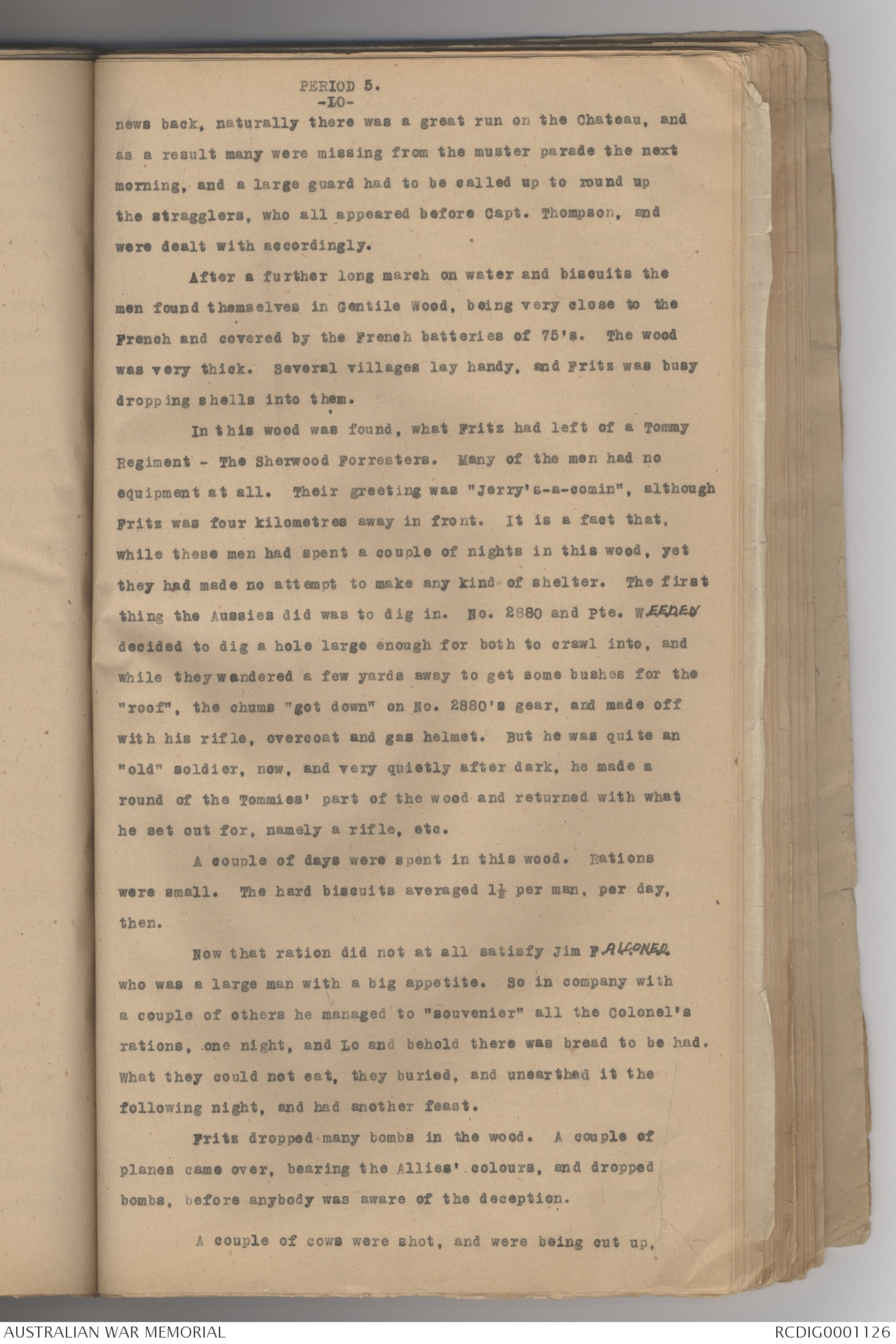
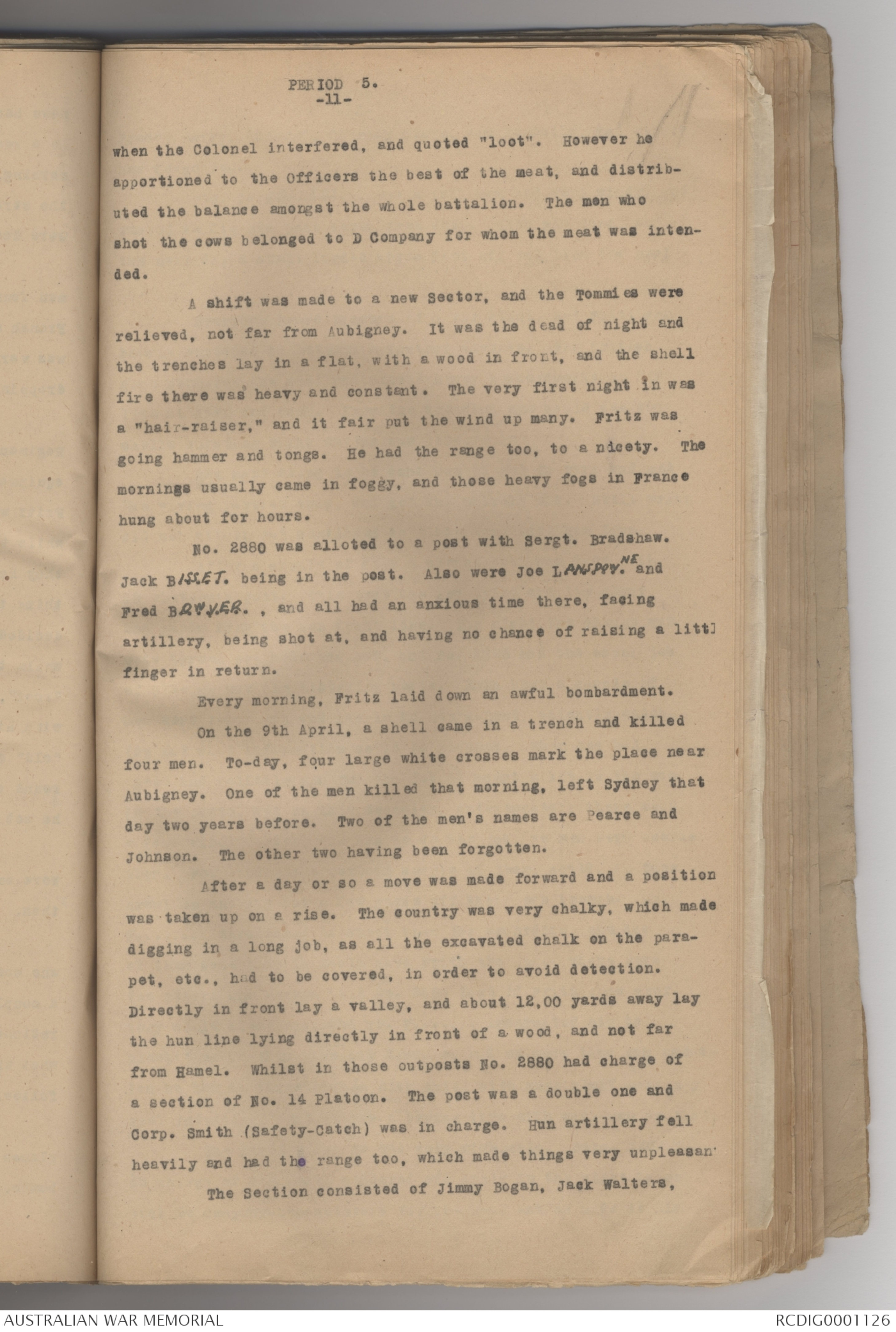
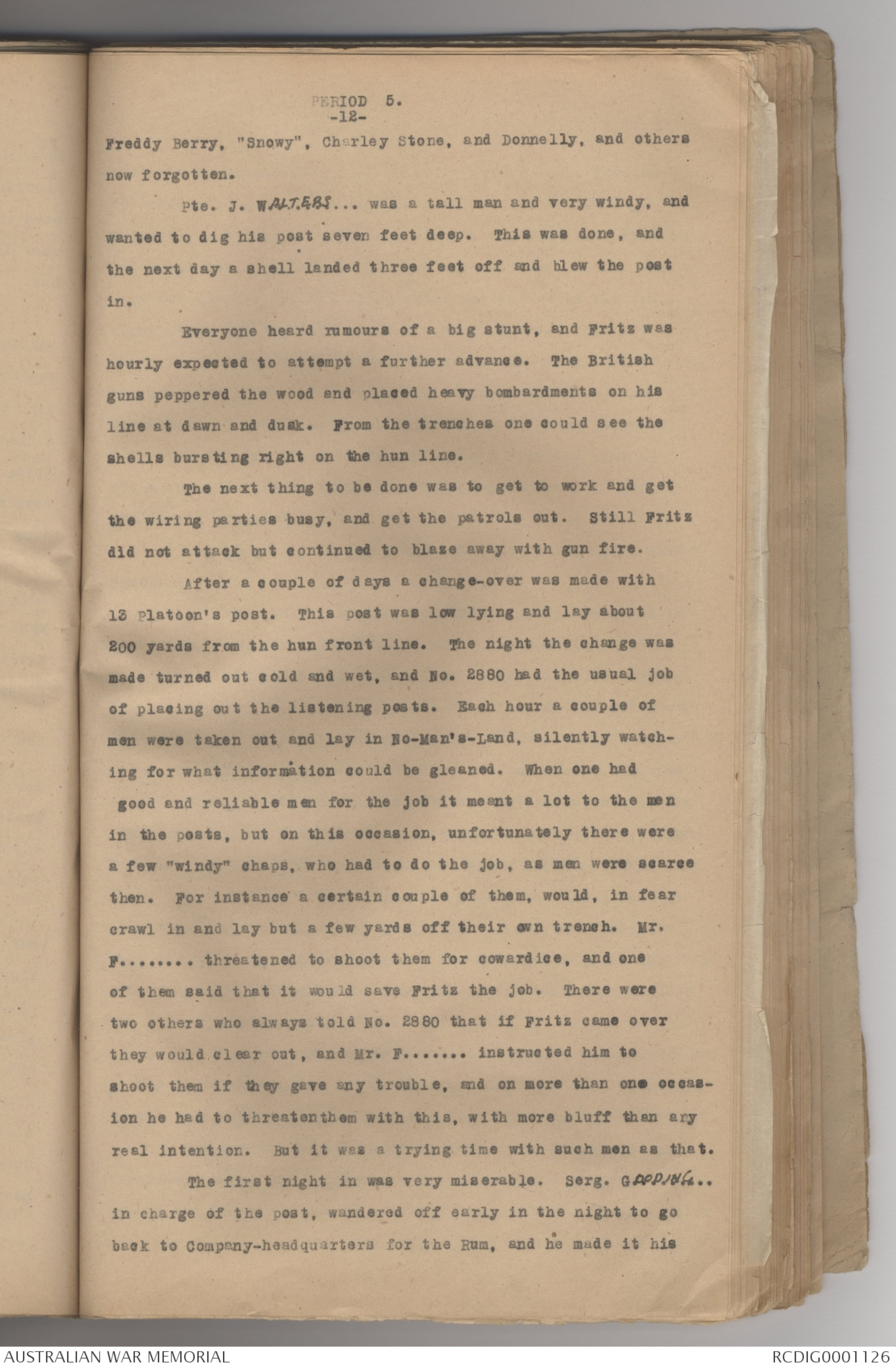
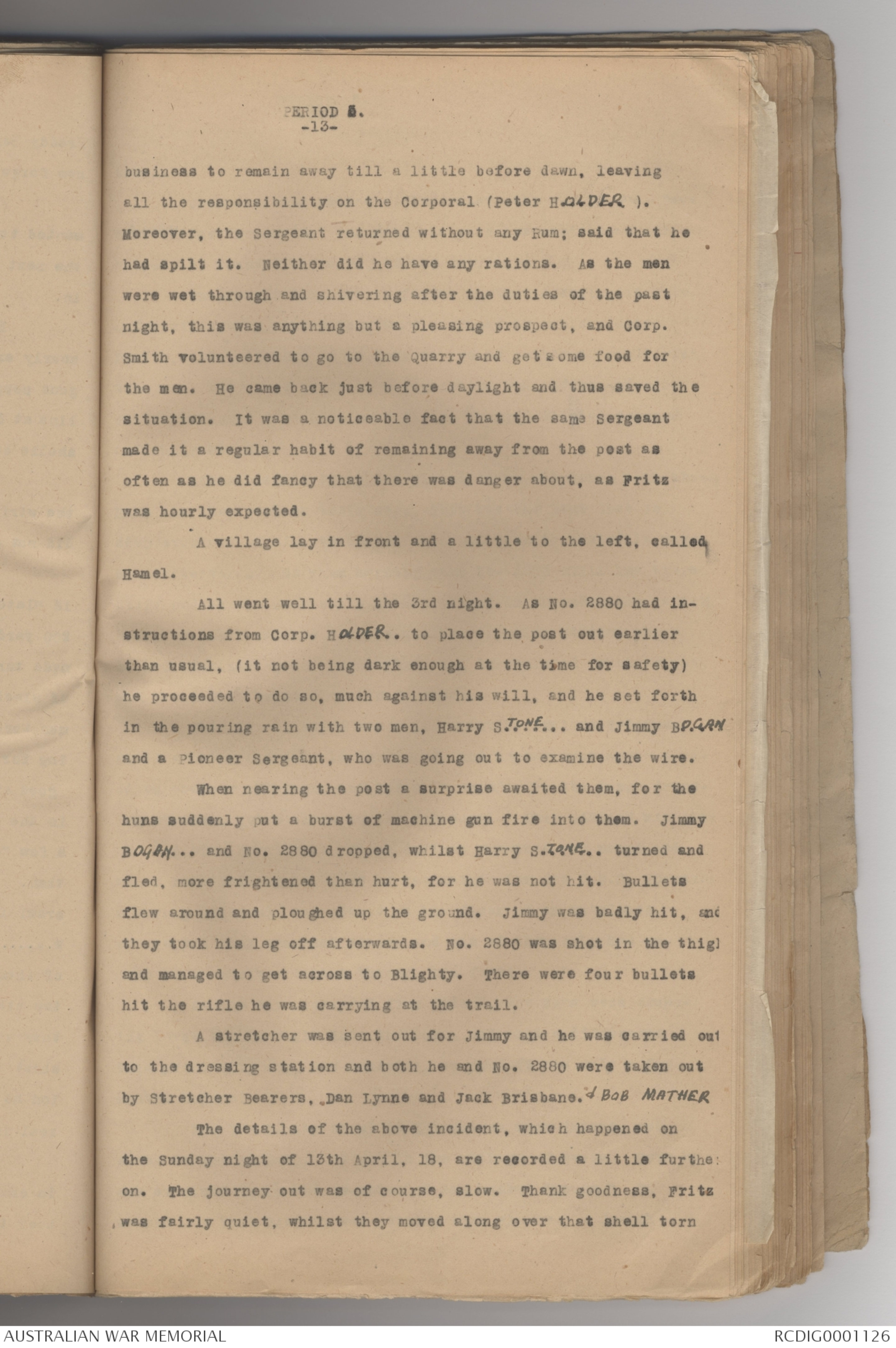
Period 5.
-4-
on account of shell fire.
Hun's Walk, Kiwi Road and Steengast Farm, were places
likely to be remembered by the men who were there.
Many salvage fatigues were carried out at Messines.
The Gothas caused a lot of trouble, and often came across
in broad daylight dropping bombs as they flew across..very
often they were shot down. One afternoon the Gothas flew over
Neuve Eglise and dropped bombs right in a football field, causing
many casualties. On their return journey two of the large number
were brought low by the little British Spad Machine, which
attained a great pace.
The hun hit on an idea of what was known as the evening
newspaper. These were small automatic balloons, which freely
dropped printed pamphlets from Fritz, usually describing his
victories. They proved a fine target for the archies to pract-
ice on.
Not far from the Castle, was a large gun on rails--A15,
hidden in amongst the trees.
Many fatigues were carried out doing barb-wire, but these
generally ended, in leaving in a hurry, being compelled to
depart on account of the whizz-bang barrages.
No. 2880 well remembers the fatigue up Fanny's Sap, and
how they all got lost and found themselves in Messines Village,
that night, and how Fritz chased them home that dark eventful
night.
The men now moved out to Desvres, a large village about
four kilometres from Boulougne, and took up the billets in an
old cement factory, not far from the station. What a relief
it was to get out of that crowded troop train, and what a
disappointment it was to the men when they saw the billets!
It was a cold winter's night, and snow and sleet were falling.
The wind howled and whistled through the broken windows, and
the floor was covered in parts with snow. What a cold shivering
night the first one was. Later on, the boys made themselves
fairly comfortable, but the doctor stopped all fires.
Period 5.
-5-
Part of the factory was in a working condition and it was
a God-send to hang around the furnace of an evening.
Joe LANSDOWNE "Johnny Walker" and No. 2880 used to all
camp together, and at times had great fun, much to the amusement
of Joe. Jack BASSET and Jack BRISBANE were constant visitors,
and everyone must remember the choir-Perce WRIGHT. , Dave
CAMPBELL, Les O....... and Reg KELLY who used to senerade
of an evening. Their favourite piece being "Down on the 'Ye-i-oh'".
A little further along the wall lived Bill HOWES and
his partner Mayberry... Further on again, lived Peter SMITH
Tom SPEEDY.., Bill SMITH.. and Cock BROWN..
So Christmas dinner came along which passed off very
well. The Colonel had managed to get hold of a couple of barrels
of beer, and some flour was obtained to which the "babblers"
put to good use. The "greasies" were Archy McGILVRAY.., Bob
BRAY......., "Ruby," Ken DUNN... and Bluey FALCONER
Quite a happy time was spent at Boulougne on leave occasionally.
While at Deavres a Platoon dinner was held. Each platoon
had one, and each man paid in five francs towards costs, and it
was both a pleasing and interesting function, and quite a success.
The Colonel was present at 15 Platoon's spread.
The men assembled in an Estaminet and were waited on by
the Madamoiselles.
A copy of the Menu reads as follows:-
M E N U
--000--
15 Platoon D Co. Battalion.
NEW YEAR'S DINNER
4th Jan., 1918.
TOASTS The King.
C.O. & Officers.
Comrades.
Allies.
Silent Toast.
Period 5.
-6-
Then follows the various courses of food, which actually
included Roast Turkey.
Some of the men that night wrote their names on the Menu
card, and written on one appears the following men's signatures.
| P. J. Holder, Cpl. | C. L. Ridley, Sgt. |
| W. J. Brown. | Perce Wright. |
| R. Kelly. | H. J. Shepherd, Sgt. |
| J. F. Lidbury. | W. H. Rhodes. |
| D. Campbell. | J.M. Lansdown. |
| Jnc. S. Bartley | J. Emmitt. |
| J. Brisbane. | J. Cruickshank. |
| T. Ogle. | B. D. Rush. |
| J. Severs. | C. B. Severs. |
| E. G. Merton 4662 | A. Weeden. |
| W. C. Brown. | R. Camac. |
| B. Jones. | James Frown, Sgt. |
| H. Heathcote. | J. Allen. |
| Thos. Speedie. | P. Smith. |
| A. McGilvray. | Robt. Bray. |
| J. Bisset. | T. A. Storey. |
| George Ogle, Cpl. | P. F. Sandow. |
It was very cold during the stay at Desvres, and the
troops were often engaged in picking the roads clear of ice.
When the roads were in that state they were very slippery, and
the clatter, clatter of the wooden boots of those old ladies
became quite a usual sound. Desvres was rather a good style
of a village. A lady barber was in attendance at the Estaminet.
Sometimes the 8th Brigade Band would play in the market square.
Market day was held once a week, in the open.
An interesting photo of the whole Battalion was taken
after a heavy fall of snow.
Cap. Thompson took over the Company command at Desvres.
After about six weeks rest the Company moved up towards Dickebush
and on to Kemmel Hill, and reached Messines once more.
This trip much wiring was done, for some knowledge of the hun
advance must have been known or expected at the time, for many
strong-posts were dug and camouflaged.
Peace River Dump hardly bore its name out when Fritz
began to shell. Shelter had to be taken in the pill boxes,
which all but rocked with the concussion of the bursting shells.
A shell entered a hut one morning and caused casualties.
Amongst the number was Bill Howes. Some of the poor beggars
were killed, and Pte. T........
received a shock.
PERIOD 5 7.
It was the same old story over again. Jerry "strafed",
and the 3rd Division made many raids. Especially at Warneton,
where an attempt was made to blow up the tower. It was finally
laid low by a direct hit from a 15" gun. The Battalion
occupied a series of strong-posts near to the Kiwi Road, and
patrols connected hourly between the posts. Movement was free
enough by night, but during the day the men had to remain low,
in order to escape observation from the enemy.
During an engineer's fatigue one night, Tom SPEEDY, was
shot. It was an awful night lumping those duck-boards and
"A" frames up past Verne Dump, and through that long sap, not
far from the dug-out, then lately occupied by the Crown Prince.
When the fatigue party was very close to Fritz, he put a burst
of machine gun fire across and Tom S.... (S.O.S. or "Drafty" as
the boys called him, received a fatal bullet.) He was buried
at Stinking Farm and opposite the grave of Cap. Stephens.
Poor old Tom always held on to a presentiment that he knew that
his time was at hand. Towards the last he became greatly troubled
about it. He often used to call to mind how he was the last
man, remaining out of the original section formed in Egypt.
Now about the same time, Sergt. P. RINGROVE was shot,
while out wiring behind Pollards Supports. The shot necessitated
a few operations, and the Sergeant, who was very popular
with the boys then, is now in Aussie, and as fit as ever.
During this period the Hun forces in front of the men
were the Saxons. These troops did not prove themselves very
antagonistic at all, but when they were relieved by the Prussian
Guards, then the fun commenced.
The Saxons hardly fired a shot, and tried to get on friendly
terms with the Aussies.
Fritz had a great eye for the cook-houses and now and then,
one or two of them would go up in the air, much to the fright of
"Ruby" and Jim FALCONER, the "babblers." Another occasion Fritz
landed a large shell at the mouth of...........
PERIOD 5.
-8-
a pill-box and imprisoned the "greasies" and Mr. WHIPP. So
the cooks did not have a rosy time of it either.
Much wiring was being done in preparation for a coming
"storm," and very soon the expected hun offensive broke out
in full force. The whole line was ablaze. The commencing
bombardment at Messines was far heavier, longer, and far
sweeping than ever before. The villages received their share
too. It seemed as if the world had come to an end. He used
an awful lot of gas with it too. Then came the news of the
attempt to break through the point where the British and French
Armies joined, and how the enemy, with his great man-power was
gaining much ground, and causing the British Army to retreat.
Along with it came the order for the Australians to move back
to the Somme again.
What a pleasant prospect that order was!
Back to the mud and elush of 1916-17 again! So after
a long term in the line at Messines the Battalion moved out to
Wulverghem, and occupied one nicht in the huts, and the next
day saw them en route for the Somme.
After marching for three days, a train was boarded,
the engine of which was mounted with machine guns, in order
to deal with the hun planes, who made attempts to drop bombs
and place machine gun fire on the trains.
Several engines were riddled with bullets, and the
ruins lying about and around the various stations bore every
evidence of the destruetive power of the bombs. Particularly
so, around Amiens and the large railway centres.
A ride in the trucks was anything but pleasant, and
No. 2880 and No. 2929 say that the men were packed like sardines
in a tin, though not laid out in such a regular manner.
From 35 to 40 men, plus rifles and full equipment, and food
necessary for the journey were packed in, and a man was exceedingly
fortunate if he could stretch out at all. Usually a
man had to occupy a cramped position for many hours, sometimes
days. A soldier had to watch his gear very carefully too,
PERIOD 5. Page -9-
else it would never be seen again, for some one else would
fancy it. Perhaps some gentleman, who had disearded his,
owing to a long carry, and who upon arrival at the end of the
journey had the cheek and audacity to walk off with another
man's gear.
If the troops could salvage a tin, a fire was got
going. This would be placed in the centre. But this procedure
usually carried a whole lot of discomfort with it, and
the usual fate of the fire was generally a violent one being
abruptly hurled out into space, with no little ceremony, on
account of its smoke raising capacities.
All along the route, the usual crowd of civilians called
out for Bully Beef for Souveniers, as they said.
Eventually the Somme was reached, and the advance was
being made against the huns who were fast approaching the City
of Amiens, which had been left at their mercy.
It is said that many of the French civilians who were preparing
to evacuate decided to remain when they became aware that
the Australians were coming up. So great was their faith.
In their flight they left their homes intact. The hun
shells killed off the cattle, pigs, etc., and the troops were
able to salvage much food, and tons of potatoes which came in
handy, as the means of transport were none too good in those
days.
Much wine lay in the collars. Wherever this was known,
a guard was placed, and the law about looting was often read to
the men. But if anything was to be found, trust the Aussies to
find it.
A stay was made for one night at the deserted village
of Vaux-Chelles (?). Now about midnight No. 2880 was awakened
by the unusual rattle of bottles, and beheld the form of Pte.
Reg KELLY... bending over him, saying "Get this into you, sport."
It was no dream, for K....... and several others had been out
"souveniering" and had hit on a large white Chateau (deserted)
and there had found immense quantities of Cider, Wine, and
Champagne, stored away in the cellars. When they brought the
PERIOD 5.
-10-
news back, naturally there was a great run on the Chateau, and
as a result many were missing from the muster parade the next
morning, and a large guard had to be called up to round up
the stragglers, who all appeared before Capt. Thompson, and
were dealt with accordingly.
After a further long march on water and biscuits the
men found themselves in Gentile Wood, being very close to the
French and covered by the French batteries of 75's. The wood
was very thick. Several villages lay handy, and Fritz was busy
dropping shells into them.
In this wood was found, what Fritz had left of a Tommy
Regiment - The Sherwood Forresters. Many of the men had no
equipment at all. Their greeting was "Jerry's-a-comin", although
Fritz was four kilometres away in front. It is a fact that,
while these men had spent a couple of nights in this wood, yet
they had made no attempt to make any kind of shelter. The first
thing the Aussies did was to dig in. No. 2880 and Pte. WEEDEN
decided to dig a hole large enough for both to crawl into, and
while they wandered a few yards away to get some bushes for the
"roof", the chums "got down" on No. 2880's gear, and made off
with his rifle, overcoat and gas helmet. But he was quite an
"old" soldier, now, and very quietly after dark, he made a
round of the Tommies' part of the wood and returned with what
he set out for, namely a rifle, etc.
A couple of days were spent in this wood. Rations
were small. The hard biscuits averaged 1½ per man, per day,
then.
Now that ration did not at all satisfy Jim FALCONER
who was a large man with a big appetite. so in company with
a couple of others he managed to "souvenier" all the Colonel's
rations, one night, and Lo and behold there was bread to be had.
What they could not eat, they buried, and unearthed it the
following night, and had another feast.
Fritz dropped many bombs in the wood. A couple of
planes came over, bearing the Allies' colours, and dropped
bombs, before anybody was aware of the deception.
A couple of cows were shot, and were being cut up,
PERIOD 5.
-11-
when the Colonel interfered, and quoted "loot". However he
apportioned to the Officers the best of the meat, and distributed
the balance amongst the whole battalion. The men who
shot the cows belonged to D Company for whom the meat was intended.
A shift was made to a new Sector, and the Tommies were
relieved, not far from Aubigney. It was the dead of night and
the trenches lay in a flat, with a wood in front, and the shell
fire there was heavy and constant. The very first night in was
a "hair-raiser," and it fair put the wind up many. Fritz was
going hammer and tongs. He had the range too, to a nicety. The
mornings usually came in foggy, and those heavy fogs in France
hung about for hours.
No. 2880 was alloted to a post with Sergt. Bradshaw.
Jack BISSET. being in the post. Also were Joe LANSDOWNE and
Fred BOWYER, and all had an anxious time there, facing
artillery, being shot at, and having no chance of raising a little
finger in return.
Every morning, Fritz laid down an awful bombardment.
On the 9th April, a shell came in a trench and killed
four men. To-day, four large white crosses mark the place near
Aubigney. One of the men killed that morning, left Sydney that
day two years before. Two of the men's names are Pearce and
Johnson. The other two having been forgotten.
After a day or so a move was made forward and a position
was taken up on a rise. The country was very chalky, which made
digging in a long job, as all the excavated chalk on the para-
pet, etc., had to be covered, in order to avoid detection.
Directly in front lay a valley, and about 12,00 yards away lay
the hun line lying directly in front of a wood, and not far
from Hamel. Whilst in those outposts No. 2880 had charge of
a section of No. 14 Platoon. The post was a double one and
Corp. Smith (Safety-Catch) was in charge. Hun artillery fell
heavily and had the range too, which made things very unpleasan
The Section consisted of Jimmy Bogan, Jack Walters,
PERIOD 5.
-12-
Freddy Berry, "Snowy", Charley Stone, and Donnelly, and others
now forgotten.
Pte. J. WALTERS... was a tall man and very windy, and
wanted to dig his post seven feet deep. This was done, and
the next day a shell landed three feet off and hlew the post
in.
Everyone heard rumours of a big stunt, and Fritz was
hourly expected to attempt a further advance. The British
guns peppered the wood and placed heavy bombardments on his
line at dawn and dusk. From the trenches one could see the
shells bursting right on the hun line.
The next thing to be done was to get to work and get
the wiring parties busy, and get the patrols out. Still Fritz
did not attack but continued to blaze away with gun fire.
After a couple of days a change-over was made with
13 Platoon's post. This post was low lying and lay about
200 yards from the hun front line. The night the change was
made turned out cold and wet, and No. 2880 had the usual job
of placing out the listening posts. Each hour a couple of
men were taken out and lay in No-Man's-Land, silently watching
for what information could be gleaned. When one had
good and reliable men for the job it meant a lot to the men
in the posts, but on this occasion, unfortunately there were
a few "windy" chaps, who had to do the job, as men were scarce
then. For instance a certain couple of them, would, in fear
crawl in and lay but a few yards off their own trench. Mr.
F........ threatened to shoot them for cowardice, and one
of them said that it would save Fritz the job. There were
two others who always told No. 2880 that if Fritz came over
they would clear out, and Mr. F....... instructed him to
shoot them if they gave any trouble, and on more than one occasion
he had to threaten them with this, with more bluff than ary
real intention. But it was a trying time with such men as that.
The first night in was very miserable. Serg. GOODING...
in charge of the post, wandered off early in the night to go
back to Company-headquarters for the Rum, and he made it his
PERIOD 5.
-13-
business to remain away till a little before dawn, leaving
all the responsibility on the Corporal (Peter HOLDER).
Moreover, the Sergeant returned without any Rum; said that he
had spilt it. Neither did he have any rations. As the men
were wet through and shivering after the duties of the past
night, this was anything but a pleasing prospect, and Corp.
Smith volunteered to go to the Quarry and get some food for
the men. He came back just before daylight and thus saved the
situation. It was a noticeable fact that the sams Sergeant
made it a regular habit of remaining away from the post as
often as he did fancy that there was danger about, as Fritz
was hourly expected.
A village lay in front and a little to the left, called
Hamel.
All went well till the 3rd night. As No. 2880 had instructions
from Corp. HOLDER. to place the post out earlier
than usual, (it not being dark enough at the time for safety)
he proceeded to do so, much against his will, and he set forth
in the pouring rain with two men, Harry STONE... and Jimmy BOGAN
and a Pioneer Sergeant, who was going out to examine the wire.
When nearing the post a surprise awaited them, for the
huns suddenly put a burst of machine gun fire into them. Jimmy
BOGAN.. and No. 2880 dropped, whilst Harry STONE.. turned and
fled, more frightened than hurt, for he was not hit. Bullets
flew around and ploughed up the ground. Jimmy was badly hit, and
they took his leg off afterwards. No. 2880 was shot in the thigh
and managed to get across to Blighty. There were four bullets
hit the rifle he was carrying at the trail.
A stretcher was sent out for Jimmy and he was carried out
to the dressing station and both he and No. 2880 were taken out
by Stretcher Bearers, Dan Lynne and Jack Brisbane. & B08 MATHER
The details of the above incident, which happened on
the Sunday night of 13th April, 18, are recorded a little furthe:
on. The journey out was of course, slow. Thank goodness, Fritz
was fairly quiet, whilst they moved along over that shell torn
 Kate Benn
Kate BennThis transcription item is now locked to you for editing. To release the lock either Save your changes or Cancel.
This lock will be automatically released after 60 minutes of inactivity.